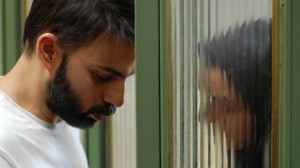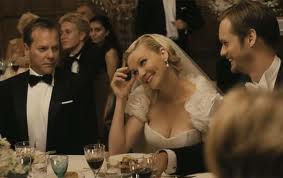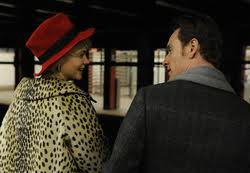 Opening with Roman Polanski’s Carnage, the 49th New York Film Festival concludes tonight at Lincoln Center. New this year, a leap into the 21st century: online ticketing, which for longtime Film Society of Lincoln Center members like me was a godsend, no more fussing with “amount not to exceed —” checks stuffed into SASEs, and no more guesswork. The films I wanted to see, I got tickets to see, period. (Never mind that the ticketing site was slow and offered the same description for every movie, meaning a fair amount of toggling back and forth between areas on the site–this was easy street compared to the clunky old way, with papers scattered about like a general planning invasion strategies.)
Opening with Roman Polanski’s Carnage, the 49th New York Film Festival concludes tonight at Lincoln Center. New this year, a leap into the 21st century: online ticketing, which for longtime Film Society of Lincoln Center members like me was a godsend, no more fussing with “amount not to exceed —” checks stuffed into SASEs, and no more guesswork. The films I wanted to see, I got tickets to see, period. (Never mind that the ticketing site was slow and offered the same description for every movie, meaning a fair amount of toggling back and forth between areas on the site–this was easy street compared to the clunky old way, with papers scattered about like a general planning invasion strategies.)
If only it were this easy even a few years ago, before I traded my Alice Tully Hall seat for a diaper changing table. Stay-at-home (cringe) parenting and the Mrs.’ work schedule restrict me to Sunday and Monday slots, and being a responsible family man I’m not going to spend every waking hour of my weekend on the Upper West Side. (I’m only going to think about spending every waking hour of my weekend on the Upper West Side.) Bottom line: where once I saw 15 or so movies a year, this year, amount not to exceed four. “And that’s that,” says the mafioso in Goodfellas, after rubbing out Joe Pesci. Festivalgoing without pity.
As it happens, my first selection, the Iranian drama A Separation, made me anxious for home within minutes. There’s little escapism at the New York Film Festival, where people go to pray to the cinema gods for a release from Transformers and Jennifer Aniston, and none in A Separation, which puts you in a head lock for two remorseless hours. It’s about a family in crisis, and sitting in the dark I got nervous for my own kin and wanted to call home. Is everything OK? Ryan didn’t fall out the window, right? Larissa’s not wandering around in traffic? Stay in the living room and don’t move until Daddy gets home.
 For all that flop sweat, though, A Separation is a great movie, a true masterpiece, and I’ll gladly repeat the whole ordeal. (If the cinema gods have any sway over the heathen Oscars it should have the foreign language prize in the bag; nothing on the dramatic front will touch it.) Let us quickly separate the increasingly unhinged Iranian government (even Al-Qaeda calls it on its nonsense) from its vibrant creative community, not that it doesn’t routinely interfere with its artists. (The jailed Jafar Panahi got his This Is Not a Film produced and into this and other festivals surreptitiously.) How the important creative work gets done is something of a mystery, and in the case of A Separation a miracle.
For all that flop sweat, though, A Separation is a great movie, a true masterpiece, and I’ll gladly repeat the whole ordeal. (If the cinema gods have any sway over the heathen Oscars it should have the foreign language prize in the bag; nothing on the dramatic front will touch it.) Let us quickly separate the increasingly unhinged Iranian government (even Al-Qaeda calls it on its nonsense) from its vibrant creative community, not that it doesn’t routinely interfere with its artists. (The jailed Jafar Panahi got his This Is Not a Film produced and into this and other festivals surreptitiously.) How the important creative work gets done is something of a mystery, and in the case of A Separation a miracle.
The writer-producer-director, Asghar Farhadi, is new to me, and was quite unassuming before a bowled-over crowd. Before A Separation began he politely asked us to clear our heads and concentrate on the film, and it worked, as within minutes I wasn’t even aware that I was reading subtitles. This family tragedy has the inexorable pull of a twisty Coen brothers thriller, without the deadpan attitude. It begins with a separation, between wife Simin (Leila Hatami), who, concerned for the country’s future, wants to leave Iran with her family, and husband Nader (Peyman Moaddi), who, with a father stricken with Alzheimer’s and requiring in-home care, is determined to stay. They air their grievances before an adjudicator, and the movie will return to the courts frequently, as a defiant Simin (the red hair tucked under her headscarf speaks volumes about her character) moves out and Nader hires a young, religious woman from a hardscrabble suburb, Razieh (the woeful-eyed Sareh Bayat), to watch his father. Razieh is quickly overwhelmed by the job, and suffice it to say mistakes are made–mistakes that force many more separations, between parents and children, the upper middle class and the poor, religious and secular lifestyles, and justice and the law. How transfixing is all this? So much so you’ll agonize over a character’s having to swear an oath on the Koran in court. You can’t say that of many movies.
Farhadi’s script has the beats of a John Grisham page-turner and, right underneath this suspenseful surface, a truly humanist vision. Everyone has their reasons, and no character is indulged or scapegoated. The performances, including that of Farhadi’s 11-year-old daughter Sarina as Nader and Simin’s increasingly pressured daughter Termeh, are outstanding across the board (if there’s been a richer or more complex portrayal this year than Moaddi’s Nader, whose life is consumed by escalating bewilderment, I haven’t seen it). Beautifully filmed and edited, with not a single wasted frame, A Separation is one of the year’s best films. It goes into release on Dec. 30.
[kml_flashembed movie=”http://www.youtube.com/v/MjTkXGRhy9w” width=”600″ height=”344″ allowfullscreen=”true” fvars=”fs=1″ /]So we meet again, Lars von Trier. I’ve seen Breaking the Waves and Dogville at the festival, and went on about the perpetual enfant terrible of Danish cinema in reviewing Antichrist two years back. After that controversial horror story Melancholia sees him spinning off in another genre direction, science fiction, and as usual he does it his way. (Which includes making ill-received wisecracks about Nazis at the movie’s Cannes premiere. Propriety isn’t his strongest suit.) It begins with a bang of a prologue, as scenes of apocalypse, filmed like fashion photography, overwhelm co-stars Kirsten Dunst and Charlotte Gainsbourg, and a planet crashes into our own, all to the thunderously amped strains of Wagner. The festival audience applauded at the end of the fireworks. Terrence Malick gave us The Tree of Life; von Trier, the Tree of Death.
 All of this whatever it was is pretty much forgotten in the first act of the film, in which Justine (Dunst) and new husband Michael (Alexander Skarsgard) arrive pathertically late for their wedding reception, and Justine receives a tongue lashing from her sister Claire (Gainsbourg), a worrier, and her husband, John (Kiefer Sutherland), who dabbles in astronomy. You’d show up late, too, if you knew what the party held. Justine and Claire’s long-estranged parents Dexter (John Hurt) and Gaby (Charlotte Rampling) makes inappropriate remarks, with Gaby (who got Rampling to wear such a grandmotherly wig?) tearing into the institution of marriage. (If you’re wondering how Dunst and the French-accented Gainsbourg could be sisters, and Hurt and Rampling their folks, you haven’t spent much time in the vonTrierverse, where such eccentric casting is the norm.) Jack (Stellan Skarsgard), who is Justine’s boss and Michael’s best man (and of course Alexander’s father off camera), dogs her to finish a copywriting assignment on the spot. Justine withdraws, grows fretful, and commits an impulsive act that brings down the curtain on the not-so-festive festivities, which recall the von Trier-produced “Dogma” hit The Celebration (1998).
All of this whatever it was is pretty much forgotten in the first act of the film, in which Justine (Dunst) and new husband Michael (Alexander Skarsgard) arrive pathertically late for their wedding reception, and Justine receives a tongue lashing from her sister Claire (Gainsbourg), a worrier, and her husband, John (Kiefer Sutherland), who dabbles in astronomy. You’d show up late, too, if you knew what the party held. Justine and Claire’s long-estranged parents Dexter (John Hurt) and Gaby (Charlotte Rampling) makes inappropriate remarks, with Gaby (who got Rampling to wear such a grandmotherly wig?) tearing into the institution of marriage. (If you’re wondering how Dunst and the French-accented Gainsbourg could be sisters, and Hurt and Rampling their folks, you haven’t spent much time in the vonTrierverse, where such eccentric casting is the norm.) Jack (Stellan Skarsgard), who is Justine’s boss and Michael’s best man (and of course Alexander’s father off camera), dogs her to finish a copywriting assignment on the spot. Justine withdraws, grows fretful, and commits an impulsive act that brings down the curtain on the not-so-festive festivities, which recall the von Trier-produced “Dogma” hit The Celebration (1998).
The fllm resumes the next day, with Justine, Claire, John, and John and Claire’s son Leo (Cameron Spurr) alone at the castle (a stunning Swedish location) where the reception was held. The tempo slows, for which I was grateful; by all means see Melancholia at the best theater you can, with good projection and a strong sound system, but don’t get stuck in seats as close to the screen as I was, where Manuel Alberto Claro’s darting, probing widescreen camerawork can cause seatsickness. Von Trier conceived Melancholia as a way to climb out of a severe depression, and Dunst, who has also wrestled with the illness, is a strong ally to the cause–she gives a remarkably supple performance, as changeable as the weather from scene to scene. Von Trier has given Justine something to get depressed about, then overcome–a rogue planet, Melancholia, that, once hidden behind the sun, is on a flyby past Earth. Or so John (a good performance by Sutherland, shaking off Jack Bauer) thinks. We know how this movie begins, and it’s up to Justine to rally her sister and nephew and show some backbone in the face of heavenly turbulence.
It seems as if I’ve given a lot away, but von Trier’s emphasis is mood and image, not plot and incident, and Claro has responded with some gorgeous, lightly desaturated, haunted tableaus (Dunst has three nude scenes; goodbye, Mary Jane!). For all that, though–and I should add that Dunst and Gainsbourg, creditably unstrung, do convince as siblings–I was only fitfully engaged by Melancholia. Maybe von Trier got into his own and Justine’s troubled heads too deeply, as parts of the movie are lost in a funk, as if under gauze bandages. Or maybe combining Runaway Bride with When Worlds Collide was never going to work. But who else would have thought to try?
Melancholia will be released on Nov. 11.
[kml_flashembed movie="http://www.youtube.com/v/wzD0U841LRM" width="600" height="344" allowfullscreen="true" fvars="fs=1" /]
Shame stars Michael Fassbender, and Michael Fassbender’s penis. Impressively long on the big screen, it deserves its own credit. Taking his current overexposure to its natural extreme Fassbender pees with it, plays with it, and fucks with it, enough to earn the film an NC-17. But not enough, I’d reckon, to dispel the kiss of death that hovers over our rarely used “adult” rating, now in its 21st year. It’s not easy to make a serious movie about sex, as Fassbender and his Hunger director, artist Steve McQueen, have tried to do. Folks who turn up to see Hugh Jackman train fighting robots just aren’t interested in the bare facts, and the audience that does show up comes down hard on anything that rings false or hypocritical or distasteful. Knowing the pitfalls, Shame takes the fallback position: it’s cold as ice, hard to the touch, difficult to, umm, penetrate.
 One reason why Hunger scored with critics is that its subject, Irish hunger strikers, wasn’t the usual one an artist might be thought to tackle. Sex is–and McQueen approaches it in the usual glum arthouse way, with a downer aesthetic. Set in New York, it begins by observing Brandon (Fassbender) on his bedroom rounds, with pickups and prostitutes, scored to Bach and other music that might accompany the burial of a murdered child. Five minutes in, the movie announces: There’ll be no joy of sex here. No joy of anything, really. When not laying pipe or masturbating over Internet porn Brandon dodges phone messages from his sister, Sissy (Carey Mulligan, with a bad dye job and draped in vintage clothes). When we meet her, we get why. It’s not just that Sissy, a singer, has suicidal impulses and other bad habits, it’s that–in the most grating scene of my film year to date–she performs a slo-mo rendition of “Theme from New York, New York” that had me covering my ears. McQueen must have thought this was cool, that it said something about her elusive character. All I wanted to do was strangle her.
One reason why Hunger scored with critics is that its subject, Irish hunger strikers, wasn’t the usual one an artist might be thought to tackle. Sex is–and McQueen approaches it in the usual glum arthouse way, with a downer aesthetic. Set in New York, it begins by observing Brandon (Fassbender) on his bedroom rounds, with pickups and prostitutes, scored to Bach and other music that might accompany the burial of a murdered child. Five minutes in, the movie announces: There’ll be no joy of sex here. No joy of anything, really. When not laying pipe or masturbating over Internet porn Brandon dodges phone messages from his sister, Sissy (Carey Mulligan, with a bad dye job and draped in vintage clothes). When we meet her, we get why. It’s not just that Sissy, a singer, has suicidal impulses and other bad habits, it’s that–in the most grating scene of my film year to date–she performs a slo-mo rendition of “Theme from New York, New York” that had me covering my ears. McQueen must have thought this was cool, that it said something about her elusive character. All I wanted to do was strangle her.
Brandon’s feelings are less resolved, though McQueen and co-writer Abi Morgan are arthouse coy about why. (Something in their bleak Irish childhood, perhaps.) Brandon’s shell does crack, yet the screenplay does little to invest us in his shame spiral. Real life does filter in–Brandon’s counterpart, co-worker David (James Badge Dale, from The Pacific), is a funny horndog who negotiates a complicated emotional life with greater ease, and the possibility of a healthier relationship for Brandon with another colleague (Nicole Beharie) is (rather improbably) extended. But the film is more comfortable with its threeways, sex clubs, and incestuous longings. There aren’t enough movies about sex, so to get another one that’s relentlessly negative is frustrating. Shame left me peeved.
Shame will be released on Dec. 2.
[kml_flashembed movie="http://www.youtube.com/v/7iolLLxPPMM" width="600" height="344" allowfullscreen="true" fvars="fs=1" /]
The festival ends with a gala screening of Alexander Payne’s The Descendants, starring George Clooney. Earlier on Sunday I’ll be attending an adjunct event, a showing of the new documentary Corman’s World: Exploits of a Hollywood Rebel, followed by a rare screening of Roger Corman’s incendiary drama The Intruder (1961), an early role for a race-baiting William Shatner. Corman is said to be in town for New York Comic Con and if the honorary Oscar winner makes it up to the Walter Reade Theater for a visit my 17th annual sojourn to the New York Film Festival, modest though it was, will be complete.





Comments